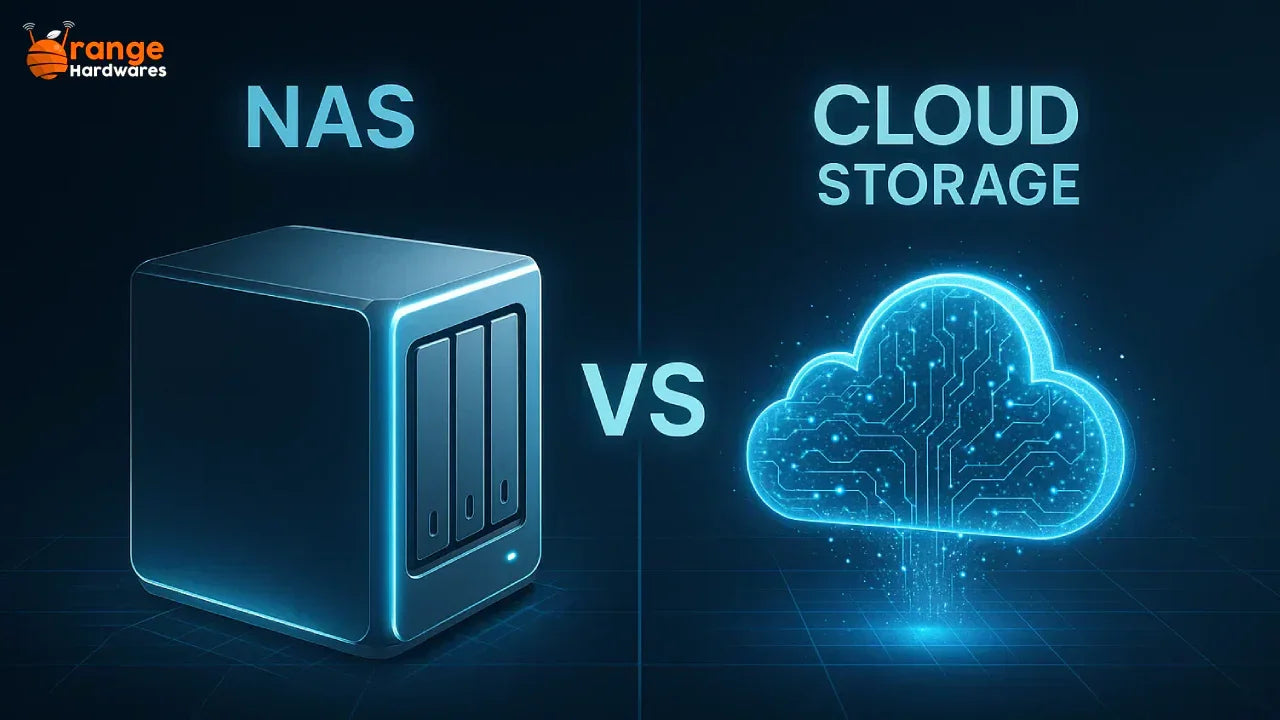All businesses have turned to data storage devices for the safekeeping of their critical data. It has become a technical requirement and a necessity for personal as well as professional use.
There can be two types of storage options available for the vast amount of information gathered daily. Either it can be saved in NAS or cloud storage. So, the debate of NAS vs cloud storage has gained significant traction. Organizations and individuals need to choose between them based on their needs.
We have composed this blog for your ease on the topic of the difference between Network Attached Storage vs Cloud Storage. You will get to see a comparison of their use of cases as well as their pros and cons. At the end, you will definitely be able to choose between the two based on your requirements.
Introduction to NAS and Cloud Storage
Network Attached Storage (NAS)
Connected to a local network, it’s a dedicated network storage device. Multiple users and devices can be connected to it, and it can store data in both, within the same network as well as remotely. The remote saving depends on the configuration.
It acts as a private as well as an on-premises cloud that gives full ownership to its users.
Cloud Storage
This storage stores data on servers. These servers are maintained by third parties that provide storage such as Google Drive, iCloud, or Amazon Web Services. The files are accessed via the internet.
This means that the data is saved off-site and managed externally.
The Core Difference of NAS Vs Cloud Storage
1. Location
NAS is a physical device that needs to be connected to your local network, whereas cloud storage is an application that relies on off-site servers and is managed by third-party providers.
2. Ownership
The NAS lets you have full control over your hardware as well as your data. Cloud storage, however, places files under other external providers for management.
3. Accessibility
NAS needs configurations for remote use, and it offers success to local devices easily. Cloud storage relies on the internet and is accessible anywhere by default.
4. Costs
NAS needs to be paid for as it’s a hardware device and requires ongoing maintenance. Cloud storage just needs a recurring subscription fee every month.
5. Scalability
The NAS’s scalability depends on the physical capacity of its device. But as the cloud storage is not dependent on any physical device, it can expand virtually without limits.
6. Security
Security-wise, NAS depends largely on user configuration and management. The cloud providers offer protection but require trust in their systems, which can be risky.
Pros and Cons of NAS
Advantages of NAS
- You have full ownership and control over your data and the security of your device and data.
- It’s a one-time investment that might be initially expensive, but there is no recurring subscription fee involved after that.
- Their file transferring speeds are much faster than relying on the internet for these tasks.
- NAS devices support RAID configurations and backups. The third-party applications can also be supported for productivity.
Recommended: Best NAS Devices for 2025
Disadvantages of NAS
- It has a high initial cost and can be a disadvantage for many budget-conscious buyers.
- You are responsible for hardware upgrades and security patches. The maintenance is also yours to take care of.
- Configuring NAS for external access requires technical knowledge and, hence, is complex for normal users.
Pros and Cons of Cloud Storage
Advantages of Cloud Storage
- You just require an internet connection, and your files will be accessible worldwide.
- It is easier to set up and is affordable with smaller capacities.
- The provider handles the security, providing you with a professional-grade system and encryption.
Disadvantages of Cloud Storage
- You have to keep paying for its subscription every month.
- Its access speed depends on what type of internet connection you have.
- The sensitive files are saved on third-party servers, which is risky for security purposes.
NAS vs Cloud Storage in 2025
As we are moving toward the future, there have been many changes in traditional cloud storage and NAS. Both have come up with new and better features. The cloud providers are now offering flexible pricing to their customers. However, the basic NAS vs online storage debate is the same, which is ownership versus convenience.
Personal NAS vs Cloud Storage
Personal NAS
It is a better choice for technical individuals who want to have control over their entire media, including photos and work documents. That’s because it provides privacy and long-term savings.
Personal Cloud Storage
Personal cloud storage is for those users who prefer simplicity and want no part in managing their hardware. It's good for sharing data files with family and friends.
NAS vs Public Cloud Storage
Public cloud services like Dropbox and Google Drive are user-friendly but have some limitations on customization. A local NAS vs cloud storage approach provides you control. Your choice depends on what you prefer between independence and convenience.
NAS vs Cloud Backup
NAS is a primary data hub, but it's more recommended as a backup for critical data to the cloud. It can be used as a hybrid strategy for primary storage and cloud for backup. This can offer you the best of both worlds. Between NAS vs cloud storage security, NAS is more secure due to its hardware properties.
NAS vs Cloud Storage Uses
NAS vs Cloud Storage for Photographers
Photographers require massive storage to keep their raw files saved and need fast and reliable access to their data. In this case:
- NAS is better for storage purposes and editing large files locally.
- Cloud storage can be used for sharing portfolios with clients all around the world.
NAS vs Cloud Storage for Video Editing
For video editing, high speeds are required for transferring purposes. In both cases:
- NAS is ideal for editing directly over a local network.
- Cloud storage is used for collaboration in workflows.
NAS vs Cloud Storage for Business
Businesses prioritize the privacy of their data over anything else, and scalability, too.
- NAS is suitable for SMBs (Small and Medium-sized Businesses) that need control and low recurring costs.
- Cloud storage helps in scaling effortlessly and supports remote teams.
NAS vs Cloud Storage for Enterprises
Enterprises typically adopt hybrid approaches:
- NAS is for sensitive data storage and compliance.
- Cloud storage is used for global accessibility and collaboration.
NAS Storage vs Dropbox/Google Drive
Apps like Dropbox and Google Drive offer simplicity. NAS provides deeper customization and cost-effectiveness in the long run.
NAS vs Cloud Storage for Home Use
Households that manage family photos and movies, etc., need storage devices.
- NAS offers centralized storage for multiple devices.
- Cloud storage is more convenient for less technical users.
Best Storage Solution: NAS or Cloud
Here are some factors that are considered for finding an answer to this, based on what you prioritize and require.
- Budget: If you prefer a one-time investment, go for NAS; otherwise, recurring fees for cloud storage should be your choice.
- Technical Expertise: NAS requires hands-on management, while cloud is plug-and-play.
- Scalability: Cloud grows effortlessly; NAS is hardware-limited.
- Data Sensitivity: Sensitive files may benefit more from NAS ownership.
Conclusion
The NAS vs cloud storage debate is about what your requirements are, and based on those requirements, you choose the one that best fits them. If you prioritize control and privacy, NAS is your choice. For scalability and convenience, cloud storage would be beneficial to you more.
A hybrid approach involving both options is a strategic option in the present. The NAS’s high-speed access and cloud backup will be a much powerful combo. Just make the best choice after understanding the difference between NAS and cloud storage, and move on to the future with the best storage option.
Need Assistance?
Request a Free Quote below and one of our sales representative will get in touch with you very soon.





